By Gary Segura and Shaun Bowler
Yesterday Latino Decisions released a new poll finding regarding the debt and deficit as part of its ImpreMedia-Latino Decisions Tracking Poll. When asked whether the preferred solution for closing the deficit was spending cuts, tax increases on the wealthy or a combination of the two, Latino voters overwhelmingly lean in the direction of taxes.
As we illustrate in Figure 1, the plurality of respondents preferred a taxes only solution (46%), with another 37% favoring a combination of taxes and spending cuts. The GOP solution—of spending cuts alone—attracts only 8% of all Latino registered voters. Put another way, 83% of Latino registered voters favored at least some tax increases to close the deficit. Moreover, the pattern was consistent across many sub-populations. Even among Republicans (who represent only about 20% of all registered voters), only 30% favor the cuts-only approach while 57% favor at least some taxation as part of the solution.
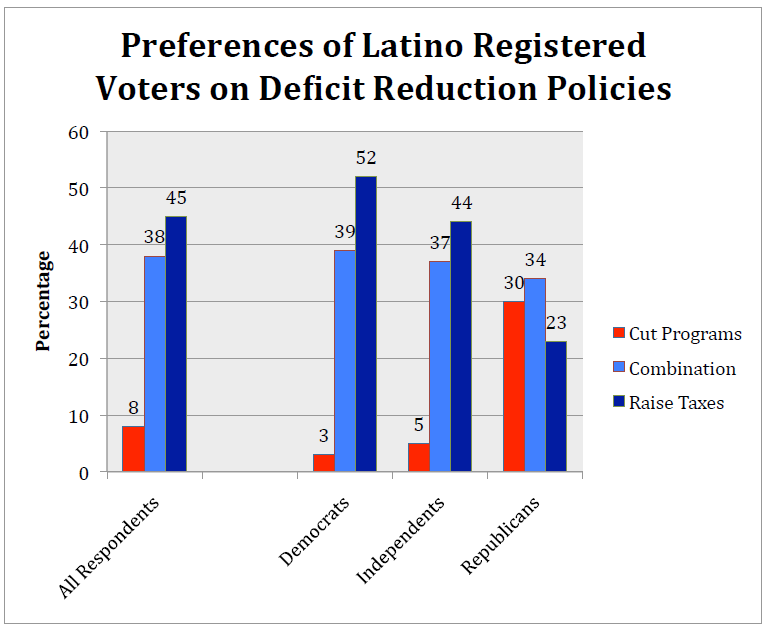
This finding, while specific to recent events and an ongoing debate, actually underlines the difficult challenge facing Republicans who wish to grow their Latino vote share. At their core, Latinos are progressives. That is, across a wide array of policy questions, Latinos on average sit significantly to the left of white Americans. More importantly, when queried about their core beliefs regarding government, its role, size and growth, Latinos (and other minorities) regularly offer views that are left of center and left of Anglos. This finding on their preferences regarding fiscal policy, then, is consistent with a large array of public opinion data.
In our new book, The Future is Ours: Minority Politics, Political Behavior, and the Multiracial Era in American Politics, we examine the core ideological commitments of Americans regarding the size of government, its role vis-à-vis that of the market, and preferences regarding important policy debates. Using data from the 2008 American National Election Study and the 2004 National Politics Study, we gain important insight into minority political views.
Figures 2 and 3 report what respondents believe about the growth of government—that is, whether it was justified and helpful. The story from these survey questions is the same: minorities are much less suspicious of government, and more willing to have government intervene to address social problems, than are Anglos.
Figure 2 reports respondents’ take on why government has grown so large. As you can see, non-Hispanic white voters are more or less evenly divided over the question of whether government stuck its nose into matters where it did not belong, or whether government grew because our nation’s problems required it. By contrast, look at the distributions among minority respondents. Huge majorities of every other group overwhelmingly report that the size and complexity of the nation’s problems demanded government increase its capacity to address them. Between 72 and 78 percent of Asian Americans, Latinos, and African Americans believe that government grew out of necessity. This represents, we believe, a meaningful and fundamental difference in how Americans of different racial and ethnic backgrounds see the political world.
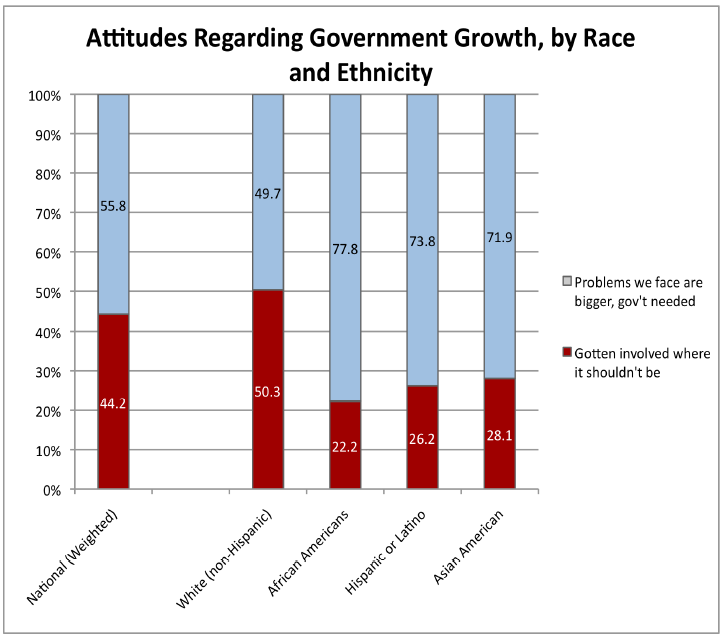
The results in Figure 3 are consistent with those in Figure 2. Here the question is whether we want government to do more, or whether the less the better. Again, racial distinctions on this question are profound. Whites, again, are more or less evenly divided. By contrast, almost 69 percent of Asian Americans favor government doing more, and among African Americans and Latinos, the comparable percentages are over 80 percent. Minority voters and white voters have markedly different expectations regarding the vigor and reach of government.
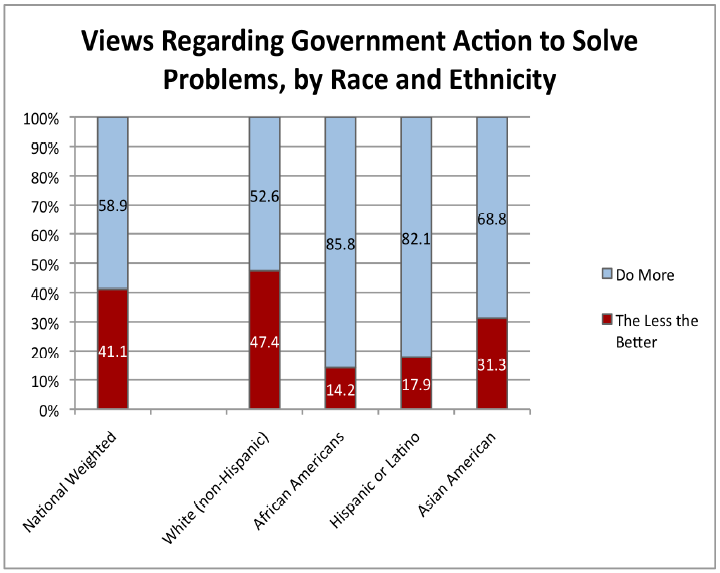
Figure 4 reports results from a somewhat different question, one designed to capture conviction in the core ideological belief of free market conservatism—that the market can solve most problems. It is clear that a majority of no group believes this. Even among whites, almost two-thirds of the respondents say that we need a strong government. But that number, again, pales in comparison with the support for government action among minorities. Almost 76 percent of Asian Americans and between 83 percent and 85 percent of African Americans and Latinos place greater trust in government action to solve problems than in the famous hidden-hand of the marketplace. These findings, including the distribution among Anglos, gives lie to the oft-repeated contention that America is a center-right nation. A large percentage of our citizens, of every group, prefer to rely on a capable government than on the market to solve our problems.
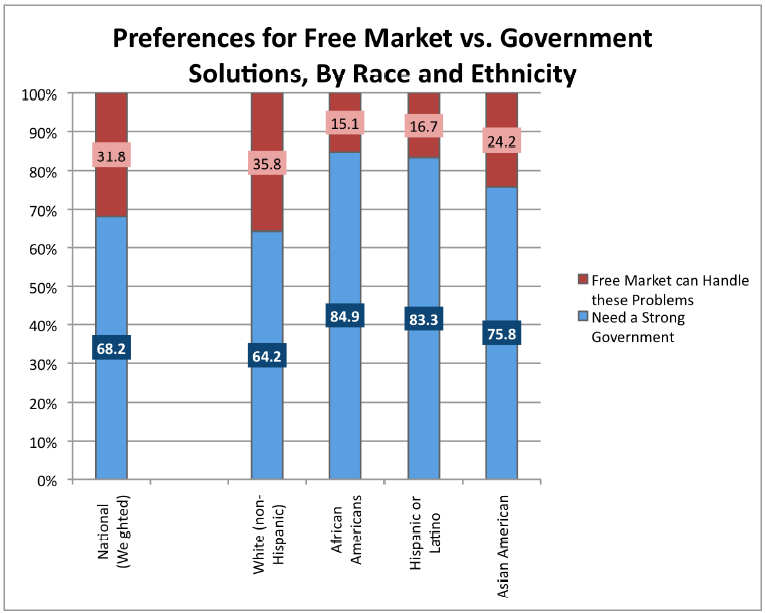
What, then, can we say about free market values and minority politics? As we just indicated, the ideological distinctions between racial and ethnic groups regarding government action are significant. Minority citizens prefer a more energetic government, by large and statistically significant margins.
Such opinions, no doubt, feed stereotypic assessments of minorities as wanting to rely on government for everything, an erroneous interpretation of these data but one you are likely to hear in the midst of heated rhetoric. Stereotyping notwithstanding, however, the belief in an energetic government aggressively addressing social problems is not the same as dependence or a “welfare mentality.” Belief in an effective government and belief in self-reliance and individual effort can go together quite nicely. Bundling those attitudes merely involves recognition that, for all their efforts, not everyone who works hard reaps the benefits (and, though seldom discussed, not everyone reaping the benefits of success has worked all that hard).
Table 1 reports what Americans believe about the relationship between hard work and success. It is pretty clear that Americans of all racial and ethnic groups buy the central claim of this “meritocratic” value. Among African Americans, 77.5 percent agree or strongly agree with this claim, and that is the lowest number among the four groups. For non-Hispanic whites and Asian Americans, the comparable numbers are 82 and 82.5 percent, respectively, and for Latinos, support for this abstract commitment to hard work is a shockingly high 92.5 percent (with the vast majority of that group “strongly” agreeing. On this most basic measure of individualism, there are few to no meaningful differences between whites, Asians, and African Americans, and Latinos exhibit even greater commitment to this “American value.”
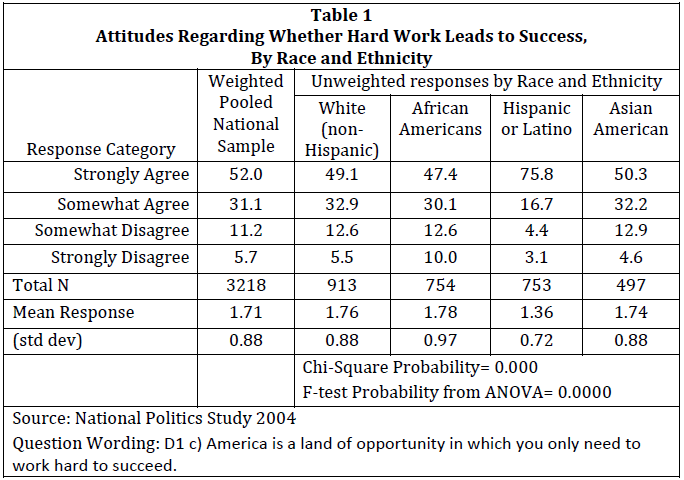
Taken together, these data suggest that stereotypes are in error, and that self-reliance can be consistent with belief in energetic government. The ideology and partisanship of minority Americans, then, are consistent and rational. It is likely, then, that anticipation of a large movement of minorities into the GOP camp is very likely to be in vain. If, for a moment, we can stereotype GOP ideology as “market good, government bad,” that spending should be cut and taxes never increased, it’s just crystal clear that super-majorities of minority Americans do not agree.
Gary Segura is Political Director, Latino Decisions, and Professor of Political Science at Stanford University. Shaun Bowler is Professor and Chair, Department of Political Science, University of California, Riverside. Their book, The Future is Ours, will be published by Congressional Quarterly Press in the Autumn of 2011.

